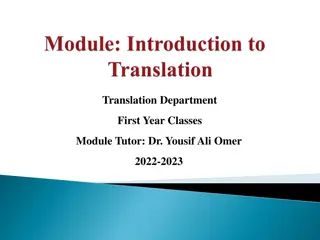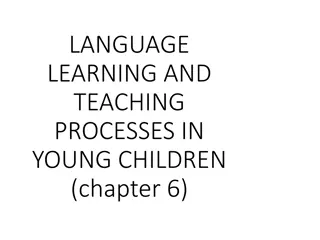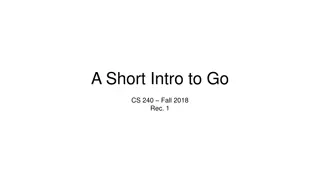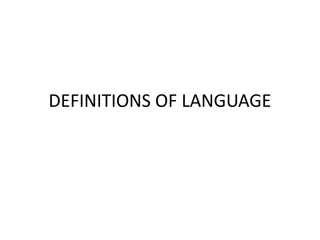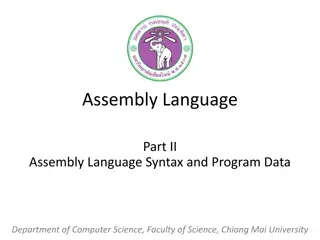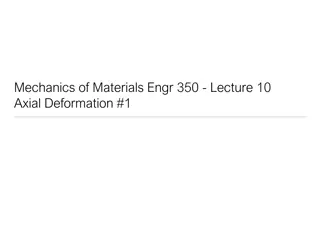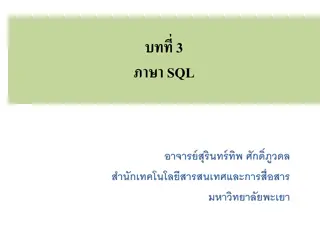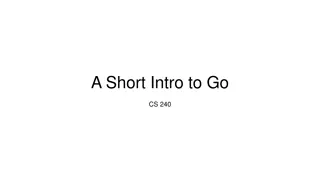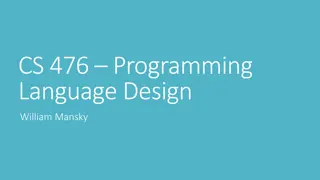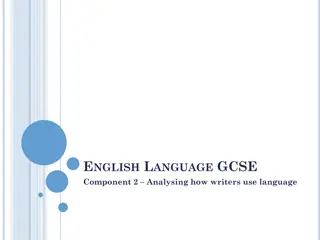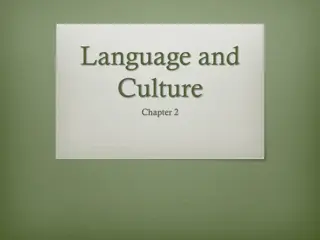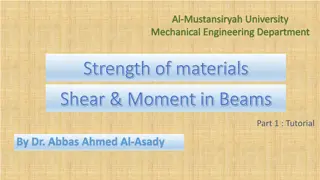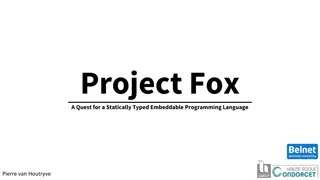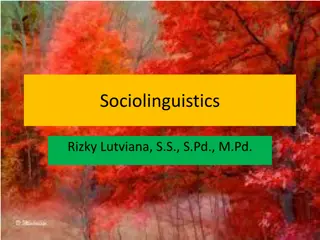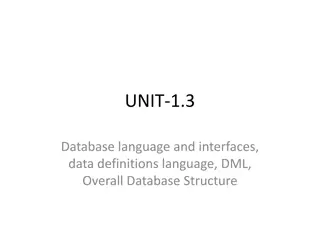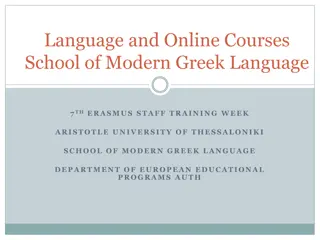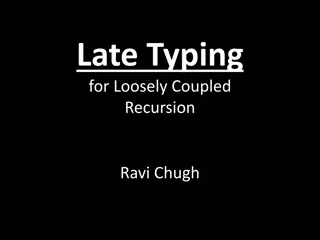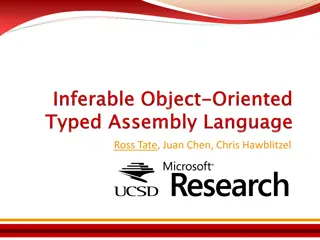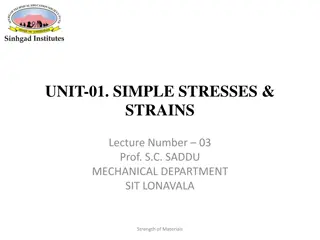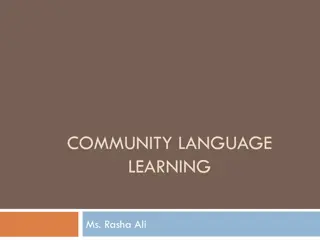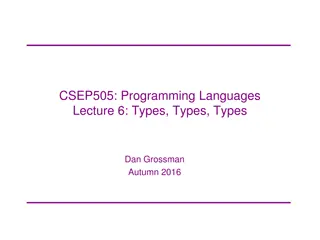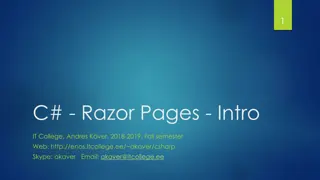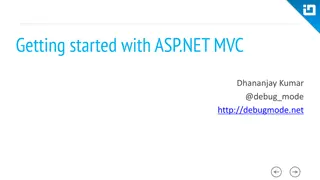Career Opportunities and Challenges in Translation & Interpreting Pedagogy Post-Pandemic
The APTIS 2022 conference explores new avenues in Translation and Interpreting (T&I) pedagogy amidst a changing landscape. Dr. Bego A. Rodriguez highlights emerging roles for T&I graduates. The context reveals a decline in language learning in the UK, impacting the Language Service Industry. The UK'
1 views • 13 slides
Language Study Community – Enhance Your Language Skills
Joining a Language Study Group is a fantastic way to take your language learning to the next level. By leveraging the power of Group Study, you can immerse yourself in the language, enhance your understanding, and build confidence in your speaking abilities. Read full article \/\/explainlearning.com
1 views • 3 slides
Academic Language Demands and Supports in Instructional Planning
Academic Language Demands and Supports are crucial in educational settings to ensure comprehension and usage of language by students. This content discusses embedding language demands in lesson plans, providing language supports, and peer review activities to enhance academic language skills. The fo
6 views • 10 slides
The Significance of Media in Language Learning
Media plays a crucial role in language learning by raising awareness of the ideology behind linguistic structures and providing valuable information on society and culture. Linguists are drawn to media language for research purposes and to understand its impact on language use and attitudes. Media s
12 views • 5 slides
Translation: Key Concepts and Definitions
Translation involves transferring written text from one language to another, while interpreting deals with oral communication. Etymologically, the term "translation" comes from Latin meaning "to carry over." It is a process of replacing an original text with another in a different language. Translat
12 views • 76 slides
Language and Communication in Society: Understanding Interactions
Explore the intricate relationship between language and society through lectures focusing on language in interaction, power dynamics, language contact and change, public space discourse, linguistic landscaping, and more. Delve into the shift from structural linguistics to societal communication, red
6 views • 28 slides
Language Learning and Teaching Processes in Young Children
Development of language in young children is influenced by various factors such as their cultural and linguistic environment, unique characteristics, and interactions with adults. Optimal language development requires language stimulation from the environment. Varied cultural practices impact langua
1 views • 51 slides
An Introduction to Go Programming Language
Go (Golang) is a compiled, concurrent, statically typed, and garbage-collected language developed by Google. It offers efficiency with good abstractions, easy multi-threading, and IO communication. Many companies choose Go for its speed and efficiency, transitioning from languages like Python due to
0 views • 17 slides
Various Definitions of Language Throughout Linguistic History
Different linguists and scholars have offered various definitions of language over time. Sapir (1921) emphasized language as a method of communicating ideas, emotions, and desires through voluntary symbols. Bloch and Trager (1942) focused on the social aspect of language as a system of vocal symbols
2 views • 12 slides
Introduction to Assembly Language Syntax and Program Data
Learn about the syntax of assembly language and how data, variables, and constants are used in programming. Explore the basic instructions and the translation of high-level language into assembly language. Discover the role of an assembler in translating assembly language programs into machine langu
5 views • 36 slides
Enhancing Language Learning Across the Curriculum in B.Ed. 1st Year Course
Language Across the Curriculum (LAC) emphasizes that language learning should occur across all subjects, not just in language classrooms. It highlights the importance of incorporating language development into every learning activity, fostering multilingualism in schools. Language plays a crucial ro
3 views • 34 slides
Formal Semantics of Programming Languages: From Lambda Calculus to Separation Logic
Explore the foundational concepts of formal semantics in programming languages, covering Lambda Calculus, Untyped and Simply-typed languages, Imperative languages, Operational and Hoare logics, as well as Separation logic. Delve into syntax, reduction rules, typing rules, and operational semantics i
8 views • 14 slides
Axial Deformation in Mechanics of Materials
In the study of mechanics of materials, axial deformation is analyzed by simplifying real structural elements. This approach involves approximations that are generally satisfactory and work due to factors like allowable stress design, factor of safety, and statistical analysis of strength. Saint-Ven
0 views • 9 slides
Comprehensive Overview of SQL Commands and Language Categories
In this detailed guide, you will learn about Structured Query Language (SQL) including its various commands such as Data Definition Language (DDL), Data Manipulation Language (DML), Data Control Language (DCL), and Transaction Control Language (TCL). Explore how SQL is used in Database Management Sy
0 views • 15 slides
Introduction to Go Programming Language
Go (also known as Golang) is a compiled, concurrent, statically typed, and garbage-collected language developed at Google by Rob Pike in 2012. It combines efficiency with good abstractions, making it ideal for system development. Many companies have adopted Go for its ease of use, speed, and efficie
1 views • 25 slides
Input and Output in Programming: A Comprehensive Guide
This content provides detailed explanations and examples on input and output handling in programming, focusing on concepts such as I/O as State, typed output, and consuming input lists. It covers topics like using print statements, scanning inputs, and building output lists in programming languages.
1 views • 44 slides
Speech and Language Developmental Milestones: A Bilingual/Multilingual Perspective
Speech and language developmental milestones are crucial for children, regardless of their home language. These milestones encompass receptive language, expressive language, pragmatics, and articulation and phonology. Understanding how a child hears and talks from birth to one year is essential, as
1 views • 23 slides
Analyzing Writer's Language Use in English Language GCSE Component 2
In English Language GCSE Component 2, students learn to analyze how writers use language. The learning objective focuses on commenting, explaining, and analyzing language use with relevant subject terminology. The exam assesses students on their ability to interpret and explain a writer's thoughts,
0 views • 12 slides
Language and Culture Reflections: Diversity in Linguistic Emphasis
Exploring the correlation between language and culture, this content delves into how various languages reflect cultural values and priorities. Through examples like the Inuit language with rich vocabulary for snow and seals, the Shinzwani culture's unique word for mother and aunt, and the evolving l
1 views • 50 slides
Shear and Moment in Beams
Beams play a crucial role in mechanical engineering, with two main types - statically determinate and indeterminate beams. Explore the definition of beams, loading types, and the concept of shear and moment diagrams to understand the behavior of beams under different loads and reactions. Learn how t
0 views • 8 slides
Project Fox: A Statically Typed Embeddable Programming Language Overview
Project Fox is a captivating journey into the development of a statically typed, embeddable programming language. Explore how the compiler and interpreters work, from source code to tokens and Abstract Syntax Trees, culminating in code generation. Dive into the nuances of semantic analysis and learn
0 views • 11 slides
Introduction to Language Technologies at Jožef Stefan International Postgraduate School
This module on Knowledge Technologies at Jožef Stefan International Postgraduate School explores various aspects of Language Technologies, including Computational Linguistics, Natural Language Processing, and Human Language Technologies. The course covers computer processing of natural language, ap
0 views • 27 slides
Sociolinguistics: Language Variation and Social Factors
Sociolinguistics delves into the study of language variation influenced by social factors, examining the relationship between language and its social context. It explores various aspects like standard pronunciation, language choice, speech acts, language components, language variety, and factors suc
0 views • 73 slides
Assembly Language Programming for Computing Layers
Assembly language is a low-level programming language that enables direct interaction with a computer's hardware components. This content explores the fundamentals of assembly language, the relationship between human-readable machine language and binary code, an assembly language program for multipl
1 views • 31 slides
Database Language and Interfaces Overview
A database management system (DBMS) requires appropriate languages and interfaces to handle queries and updates for data manipulation and control. This includes Data Definition Language (DDL), Data Manipulation Language (DML), Data Control Language (DCL), and Transaction Control Language (TCL). Each
1 views • 12 slides
Language Anxiety in Foreign Language Learning and Teaching
Explore the impact of language anxiety on students and teachers in foreign language learning and teaching contexts through insights from Dr. Christina Gkonou's research. Delve into the theoretical background, implications for language education, and real-life experiences shared at the Essex Language
0 views • 25 slides
Strengthening Language Rights: Official Languages (Amendment) Act 2021
The Official Languages (Amendment) Act 2021, enacted to strengthen the language rights of Irish speakers, introduces provisions for public bodies' communications in official languages. Section 10A requires public bodies to allocate a minimum of 20% of advertising in Irish and 5% of ad expenditure in
0 views • 49 slides
School of Modern Greek Language: Courses, Seminars, and Assessment Overview
Explore the School of Modern Greek Language at Aristotle University of Thessaloniki offering language courses, seminars for teachers, and assessment exams. Founded in 1970, the school provides a multicultural environment for students worldwide, emphasizing Greek culture and offering a variety of lan
0 views • 17 slides
Transitivity of Properties in Typed Systems
Exploring the concept of transitivity in properties within a typed system, this content delves into explicit and possibly transitive properties, showcasing how properties relate to each other and how they can be implicitly or explicitly defined. Through examples and explanations, the content provide
0 views • 18 slides
Late Typing in Loosely Coupled Recursion
Explore late typing in loosely coupled recursion through JavaScript and simply-typed calculations. Witness the intricacies of open function types and the guarantee-rely mechanism in defining functions for effective programming.
0 views • 14 slides
Importance of Good Note-Taking Strategies in Learning
Taking good notes is essential for better understanding and retention of information. Research shows that handwritten notes are more effective than typed ones as they engage the brain better. To take good notes, preview the material, review previous notes, focus on key points, use visuals, and be co
0 views • 12 slides
Typed Assembly Language and Type Inference in Program Compilation
The provided content discusses the significance of typed assembly languages, certifying compilers, and the role of type inference in program compilation. It emphasizes the importance of preserving type information for memory safety and vulnerability prevention. The effectiveness of type inference me
0 views • 17 slides
Simple Stresses and Strains in Material Strength
Explore the concept of simple stresses and strains in Strength of Materials through lectures and numerical examples. Understand statically determinate bars and beams, calculations of material elongation and dimension changes, as well as solving problems related to axial loads and bar displacements.
0 views • 17 slides
Enhancing Regression Test Selection with Static Analysis
Regression testing can be time-consuming, especially with large test suites and frequent code changes. This research explores the use of Static Regression Test Selection (SRTS) to improve efficiency by analyzing Java class files and dependencies statically. The comparison with Dynamic RTS highlights
0 views • 35 slides
DLL Hijacking in Windows
Dynamic-Link Libraries (DLLs) are a mechanism in Windows for sharing code and data, making it easier to design and build applications. By loading DLLs either statically at compile time or dynamically at runtime, programs can enhance memory management and user experience. However, DLL hijacking, a co
0 views • 13 slides
Language Views and Norm Change in Standardized Finnish: An Examination by Henni Pajunen
Henni Pajunen explores language views and resistance to norm change in standardized Finnish at the XVII Muutuva Keele Päev Conference. The research delves into language planning in Finland, historical shifts in Finnish language norms, and specific orthographic norms relating to verbs. The study she
0 views • 21 slides
Effective Community Language Learning Method by Ms. Rasha Ali
Community Language Learning (CLL) method emphasizes understanding students' feelings and creating a supportive environment for language learning. This approach, influenced by the Counseling-Learning approach, focuses on building relationships, reducing anxiety, and promoting effective communication
1 views • 15 slides
Types in Programming Languages: Lecture Insights
The lecture delves into the intricacies of types in programming languages, focusing on simply-typed Lambda-Calculus, safety, preservation, progress, and extensions like pairs, datatypes, and recursion. It discusses static vs. dynamic typing, Curry-Howard Isomorphism, subtyping, type variables, gener
0 views • 73 slides
Introduction to C# Razor Pages in ASP.NET Core MVC
C# Razor Pages is a new aspect of ASP.NET Core MVC framework, designed for page-focused workflows. It simplifies web application development by allowing the mixing of C# code with HTML in a single file. This technology enables the creation of basic pages, handling different web verbs, and working wi
0 views • 22 slides
Introduction to ASP.NET MVC: Understanding Controllers, Views, and Models
Explore the fundamentals of ASP.NET MVC with Dhananjay Kumar in this informative webinar. Delve into the concepts of Controllers, Views, and Models, learn about ViewBag, ViewData, and TempData, and discover the benefits of using client-side libraries like jQuery and Ignite UI. Gain insights into str
0 views • 31 slides




